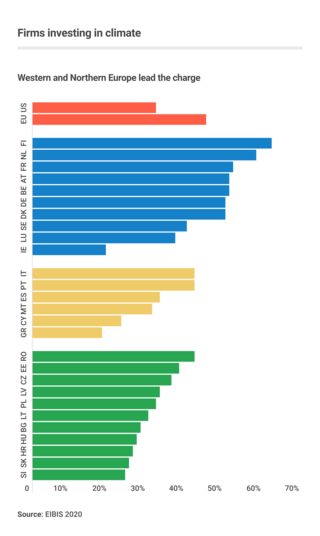
Business action on climate change includes a range of activities relating to climate change, and to influencing political decisions on climate change-related regulation, such as the Kyoto Protocol. Major multinationals have played and to some extent continue to play a significant role in the politics of climate change, especially in the United States, through lobbying of government and funding of climate change deniers. Business also plays a key role in the mitigation of climate change, through decisions to invest in researching and implementing new energy technologies and energy efficiency measures.
Greenpeace USA is the United States affiliate of Greenpeace International, an environmental nonprofit organization that spawned a social movement inspired by direct actions on the high seas to stop whaling and nuclear testing. Headquartered in Washington D.C., Greenpeace U.S.A. operates with an annual budget of approximately $40 million, employing over 500 people in 2020. The organization relies on donations from members, refuses corporate contributions and refrains from endorsing political candidates, though in 2020 Greenpeace USA issued climate scorecards for presidential candidates and ranked them from best to worst on climate

Individual action on climate change can include personal choices with regards to diet, travel, lifestyle, consumption of goods and services, family size and so on. Individuals can also get active in local and political advocacy work around climate action. People who wish to reduce their carbon footprint, can for example reduce air travel and driving cars, they can eat mainly a plant-based diet, use consumer products for longer, or have fewer children. Avoiding meat and dairy foods has been called "the single biggest way" how an individual can reduce their environmental impact. Scholars find that excessive consumption is more to blame for climate change than population increase. High consumption lifestyles have a greater environmental impact, with the richest 10% of people emitting about half the total lifestyle emissions.

An energy transition is a major structural change to energy supply and consumption in an energy system. Currently, a transition to sustainable energy is underway to limit climate change. As much sustainable energy is renewable it is also known as the renewable energy transition. The current transition aims to reduce greenhouse gas emissions from energy quickly and sustainably, mostly by phasing-down fossil fuels and changing as many processes as possible to operate on low carbon electricity. A previous energy transition perhaps took place during the Industrial Revolution from 1760 onwards, from wood and other biomass to coal, followed by oil and later natural gas.

The 2015 United Nations Climate Change Conference, COP 21 or CMP 11 was held in Paris, France, from 30 November to 12 December 2015. It was the 21st yearly session of the Conference of the Parties (COP) to the 1992 United Nations Framework Convention on Climate Change (UNFCCC) and the 11th session of the Meeting of the Parties (CMP) to the 1997 Kyoto Protocol.
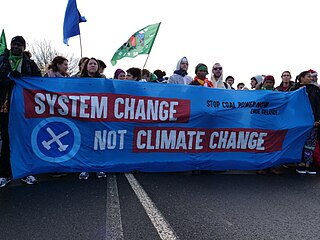
The climate movement is a global social movement focused on pressuring governments and industry to take action addressing the causes and impacts of climate change. Environmental non-profit organizations have engaged in significant climate activism since the late 1980s and early 1990s, as they sought to influence the United Nations Framework Convention on Climate Change (UNFCCC). Climate activism has become increasingly prominent over time, gaining significant momentum during the 2009 Copenhagen Summit and particularly following the signing of the Paris Agreement in 2016.

Climate change litigation, also known as climate litigation, is an emerging body of environmental law using legal practice to set case law precedent to further climate change mitigation efforts from public institutions, such as governments and companies. In the face of slow climate change politics delaying climate change mitigation, activists and lawyers have increased efforts to use national and international judiciary systems to advance the effort. Climate litigation typically engages in one of five types of legal claims: Constitutional law, administrative law, private law (challenging corporations or other organizations for negligence, nuisance, etc., fraud or consumer protection, or human rights.

Extinction Rebellion is a UK-founded global environmental movement, with the stated aim of using nonviolent civil disobedience to compel government action to avoid tipping points in the climate system, biodiversity loss, and the risk of social and ecological collapse. Extinction Rebellion was established in Stroud in May 2018 by Gail Bradbrook, Simon Bramwell, Roger Hallam, Stuart Basden, along with six other co-founders from the campaign group Rising Up!

A climate emergency declaration or declaring a climate emergency is an action taken by governments and scientists to acknowledge humanity is in a climate crisis.

Licypriya Kangujam is a child environmental activist from India. One of the youngest climate activists globally, she addressed world leaders at the 2019 United Nations Climate Change Conference in Madrid, Spain, asking them to take immediate climate action. Licypriya has been campaigning for climate action in India since 2018, to pass new laws to curb India's high pollution levels, and to make climate-change literacy mandatory in schools. She has been regarded as India's Greta Thunberg, though she does not like the usage of this term.
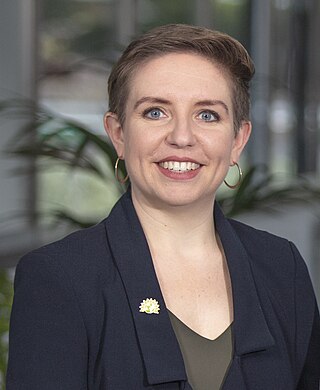
Carla Suzanne Denyer is a British politician who has served as co-leader of the Green Party of England and Wales alongside Adrian Ramsay since 1 October 2021. She has been a city councillor in Bristol since 2015. She is also noted for her lead role in bringing about Bristol City Council's declaration of a climate emergency in 2018, which was the first in Europe.

The tobacco industry playbook, tobacco strategy or simply disinformation playbook describes a strategy devised by the tobacco industry in the 1950s to protect revenues in the face of mounting evidence of links between tobacco smoke and serious illnesses, primarily cancer. Much of the playbook is known from industry documents made public by whistleblowers or as a result of the Tobacco Master Settlement Agreement. These documents are now curated by the UCSF Truth Tobacco Industry Documents project and are a primary source for much commentary on both the tobacco playbook and its similarities to the tactics used by other industries, notably the fossil fuel industry. It is possible that the playbook may even have originated with the oil industry.

The 2022 United Nations Climate Change Conference or Conference of the Parties of the UNFCCC, more commonly referred to as COP27, was the 27th United Nations Climate Change conference, held from 6 November until 20 November 2022 in Sharm El Sheikh, Egypt. It took place under the presidency of Egyptian Minister of Foreign Affairs Sameh Shoukry, with more than 92 heads of state and an estimated 35,000 representatives, or delegates, of 190 countries attending. It was the fifth climate summit held in Africa, and the first since 2016.
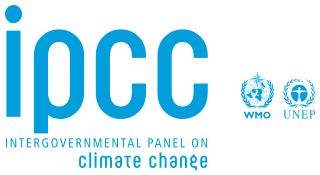
The Sixth Assessment Report (AR6) of the United Nations (UN) Intergovernmental Panel on Climate Change (IPCC) is the sixth in a series of reports which assess the available scientific information on climate change. Three Working Groups covered the following topics: The Physical Science Basis (WGI); Impacts, Adaptation and Vulnerability (WGII); Mitigation of Climate Change (WGIII). Of these, the first study was published in 2021, the second report February 2022, and the third in April 2022. The final synthesis report was finished in March 2023.

Andreas Malm is a Swedish author and an associate professor of human ecology at Lund University. He is on the editorial board of the academic journal Historical Materialism, and has been described as a Marxist. Naomi Klein, who quoted Malm in her book This Changes Everything, has called him "one of the most original thinkers on the subject" of climate change.
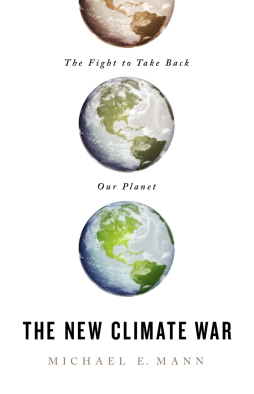
The New Climate War: The Fight to Take Back Our Planet is a 2021 book on climate change by the American climatologist and geophysicist Michael E. Mann. In the book, Mann discusses the actions of the fossil fuel industry to delay action on climate change, the responses to climate change that he considers inadequate, and the responses he considers the best. The book received positive reviews. Mann argued in an interview with Rolling Stone's Jeff Goodell that a "clean energy revolution and climate stabilization are achievable with current technology. All we require are policies to incentivize the needed shift."
Margaret Klein Salamon is an clinical psychologist and climate activist in the United States. Salamon is a leader of the Climate Emergency Fund, co-founder and leader of The Climate Mobilization, and leader of Climate Awakening. In 2014, she co-founded The Climate Mobilization. She is an advocate for an "all hands on deck" mobilization against climate change and has defended controversial tactics and unlawful activity of Just Stop Oil, which Climate Emergency Fund finances.
A global energy crisis began in the aftermath of the COVID-19 pandemic in 2021, with much of the globe facing shortages and increased prices in oil, gas and electricity markets. The crisis was caused by a variety of economic factors, including the rapid post-pandemic economic rebound that outpaced energy supply, and escalated into a widespread global energy crisis following the Russian invasion of Ukraine. The price of natural gas reached record highs, and as a result, so did electricity in some markets. Oil prices hit their highest level since 2008.
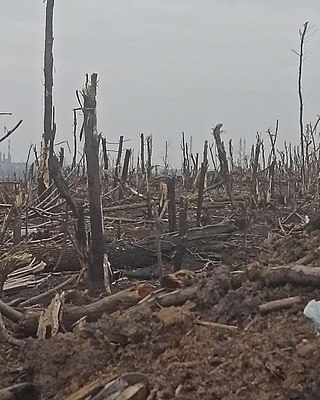
The Russian invasion of Ukraine has led to ongoing widespread and possibly serious and long-term environmental damage. The Ukrainian government, journalists and international observers describe the damage as ecocide.
Yusuf Baluch is an indigenous Climate justice and Human Rights activist. He started activism after experiencing the first hand impacts of the climate crisis in his community. He is an organizer with School Strike for Climate where he organizes with the regional chapter of Fridays For Future Balochistan.
















